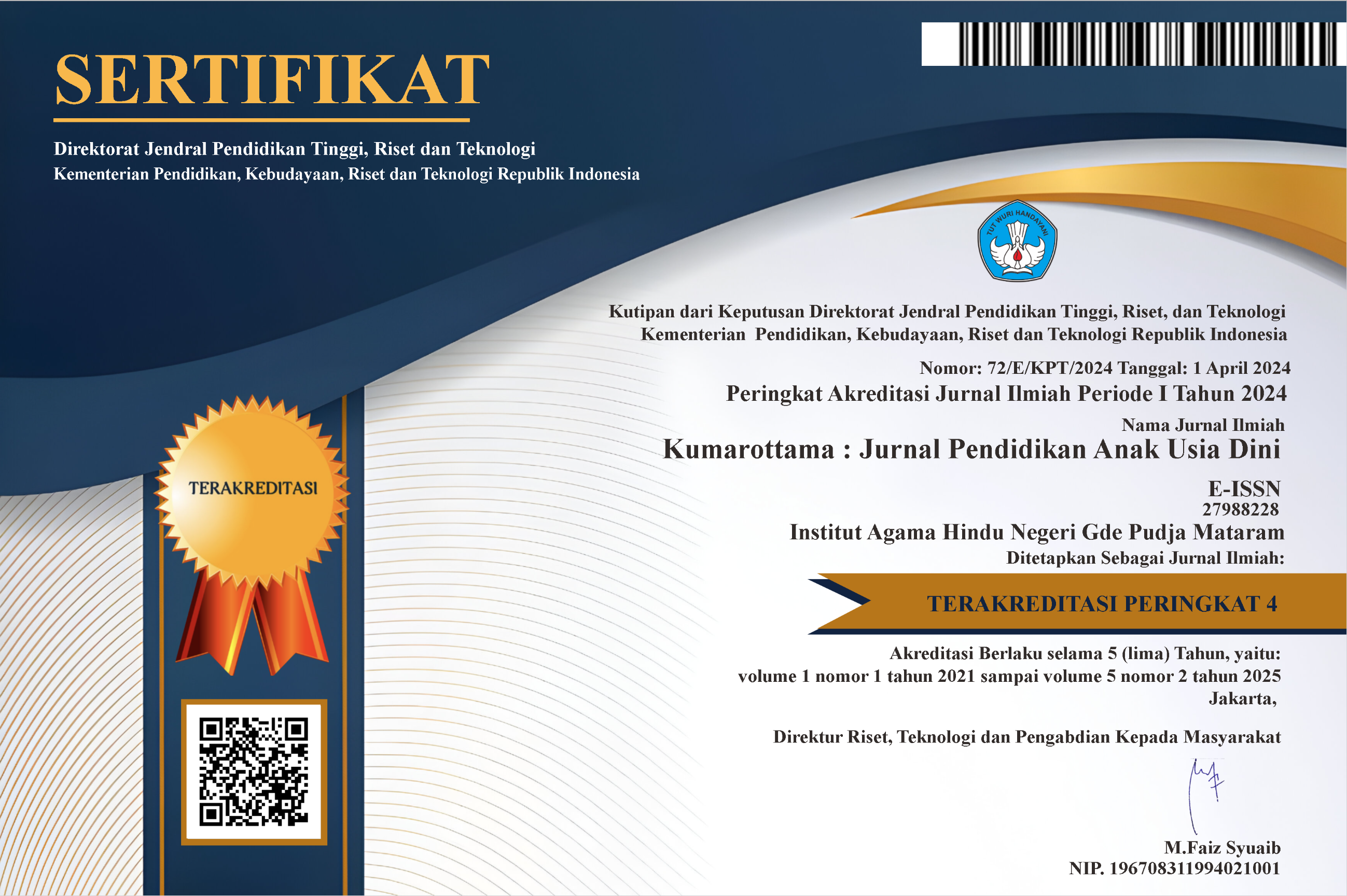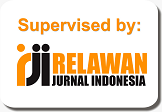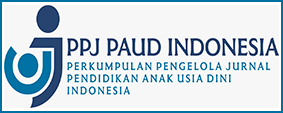Literature Review: Dampak Teknologi Digital terhadap Regulasi Emosi Anak Usia Dini dan Peran Pengawasan Orang Tua
Abstract
This research discusses the impact of digital technology on early childhood emotion regulation and the role of parental supervision. In the digital age, children are increasingly exposed to digital devices, which can affect their mental health and emotional development. The purpose of this study is to identify the relationship between digital technology use and children's mental health, as well as effective parental supervision strategies. The method used was a literature review with a scoping review technique, which allowed mapping the existing literature related to this topic. The findings suggest that unmanaged technology use can increase the risk of emotional and social disorders in children. However, good parental supervision can mitigate these negative impacts. This study contributes to a better understanding of the importance of parents' role in managing technology use among children. The results emphasize the need for family-based interventions to support children's mental health in the digital age.
References
Alia, T., & Irwansyah, I. (2018). Pendampingan orang tua pada anak usia dini dalam penggunaan teknologi digital [parent mentoring of young children in the use of digital technology]. Polyglot: Jurnal Ilmiah, 14(1), 65-78. http://dx.doi.org/10.19166/pji.v14i1.639
Anjani, R., Mashudi , E. A., & Nuroniah, P. (2024). Literature Review: Early Childhood Parenting Efforts in Dual Earner Family. Aulad: Journal on Early Childhood, 7(3), 645–662. https://doi.org/10.31004/aulad.v7i3.755
Asmaradhani, D. T. (2024). Perspektif Neuropsikologi mengenai Dampak Screen Time terhadap Perkembangan Anak Usia Dini. Murhum: Jurnal Pendidikan Anak Usia Dini, 5(1), 1004-1017. https://doi.org/10.37985/murhum.v5i1.388
Bohnert, M., & Gracia, P. (2021). Emerging digital generations? Impacts of child digital use on mental and socioemotional well-being across two cohorts in Ireland, 2007–2018. Child Indicators Research, 14, 629-659. https://doi.org/10.1007/s12187-020-09767-z
Buulolo, B. (2023). Dampak Kekerasan Verbal di Lingkungan Sekolah. CERDAS-Jurnal Pendidikan, 2(1), 9-22. https://doi.org/10.58794/cerdas.v2i1.176
Cao, S., & Li, H. (2023). A scoping review of digital well-being in early childhood: Definitions, measurements, contributors, and interventions. International Journal of Environmental Research and Public Health, 20(4), 3510. https://doi.org/10.3390/ijerph20043510
Choy, Y. N., Lau, E. Y. H., & Wu, D. (2024). Digital parenting and its impact on early childhood development: A scoping review. Education and Information Technologies, 1-41. https://doi.org/10.1007/s10639-024-12643-w
De Lima, L., & Castronuevo, E. (2016). Perception of parents on children’s use of gadgets. The Bedan Journal of Psychology, II, 26-34.
Ellis, L. A., Dammery, G., Wells, L., Ansell, J., Smith, C. L., Tran, Y., ... & Zurynski, Y. (2022). Psychological distress and digital health service use during COVID-19: A national Australian cross-sectional survey. Frontiers in Psychiatry, 13, 1028384. https://doi.org/10.3389/fpsyt.2022.1028384
Gani, S. A. (2017). Parenting digital natives: Cognitive, emotional, and social developmental challenges. In International Conference on Education (pp. 870-880).
Gumelar, G. (2023). Catatan Editor: Menavigasi Tantangan dan Menciptakan Peluang, Peran Vital Ilmu Psikologi di Era Kecerdasan Buatan. Jurnal Penelitian dan Pengukuran Psikologi: JPPP, 12(1), 1-4. https://doi.org/10.21009/jppp.121.01
Hao, Y., De France, K., & Evans, G. W. (2022). Persistence on challenging tasks mediates the relationship between childhood poverty and mental health problems. International journal of behavioral development, 46(6), 562-567. https://doi.org/10.1177/01650254221116870
Harahap, A. F. Z., Aqilasyach, D., Syafawaty, F. A., Zen, F. S., Zuhra, M., Elza, M. P., ... & Fajriawati, F. (2024). Implikasi Kesehatan Mental Akibat Kasus Kekerasan Seksual Terhadap Anak di Bawah Umur. JERUMI: Journal of Education Religion Humanities and Multidiciplinary, 2(1), 497-502. https://doi.org/10.57235/jerumi.v2i1.2010
Hoge, E., Bickham, D., & Cantor, J. (2017). Digital media, anxiety, and depression in children. Pediatrics, 140(Supplement_2), S76-S80. https://doi.org/10.1542/peds.2016-1758G
Hosokawa, R., & Katsura, T. (2018). Association between mobile technology use and child adjustment in early elementary school age. PloS one, 13(7), e0199959. https://doi.org/10.1371/journal.pone.0199959
Ibrahem, E. M., Zaki, S. M., & Abdelwahab, A. A. (2024). Effect of implementing parental strategies on preventing digital overdependence among their preschool children. Tanta Scientific Nursing Journal, 33(2). https://doi.org/10.21608/tsnj.2024.361844
Istenič, A., Rosanda, V., Volk, M., & Gačnik, M. (2023). Parental Perceptions of Child’s Play in the Post-Digital Era: Parents’ Dilemma with Digital Formats Informing the Kindergarten Curriculum. Children, 10(1), 101. https://doi.org/10.3390/children10010101
Manfaatin, E., & Aulia, M. (2024). Pengaruh Screen Time terhadap Perkembangan Anak Usia Dini. al-muhadzab: Jurnal Pendidikan Islam Anak Usia Dini, 1(1), 18-31.
Martín-Criado, J. M., Casas, J. A., & Ortega-Ruiz, R. (2021). Parental supervision: Predictive variables of positive involvement in cyberbullying prevention. International Journal of Environmental Research and Public Health, 18(4), 1562. https://doi.org/10.3390/ijerph18041562
Metherell, T. E., Ghai, S., McCormick, E. M., Ford, T. J., & Orben, A. (2021). Digital exclusion predicts worse mental health among adolescents during COVID-19. medRxiv, 2021-11. https://doi.org/10.1101/2021.11.25.21266853
Morawska, A., Mitchell, A. E., & Tooth, L. R. (2023). Managing screen use in the under-fives: Recommendations for parenting intervention development. Clinical child and family psychology review, 26(4), 943-956. https://doi.org/10.1007/s10567-023-00435-6
Munafiah, N., & Latif, M. A. (2022, December). Peran Orang tua pada Kegiatan Screen time Anak Usia Dini. In Annual Conference on Islamic Early Childhood Education (ACIECE) (Vol. 6, pp. 23-28). Retrieved from https://conference.uin-suka.ac.id/index.php/aciece/article/view/915
Muspratiwi, D., Suryani, S., & Hidayati, N. O. (2024). Implementation of Digital Parenting on Early Childhood Gadget Addiction: A Scoping Review. Poltekita: Jurnal Ilmu Kesehatan, 17(4), 1464-1469. https://doi.org/10.33860/jik.v17i4.3631
Peters, M. D., Godfrey, C. M., Khalil, H., McInerney, P., Parker, D., & Soares, C. B. (2015). Guidance for conducting systematic scoping reviews. JBI Evidence Implementation, 13(3), 141-146. https://doi.org/10.1097/xeb.0000000000000050
Petrou, C., Jameel, L., Nahabedian, N., & Kane, F. (2023). A call for digital inclusion initiatives in mental health services: An integrative review. Journal of Psychiatric and Mental Health Nursing, 30(5), 911-941. https://doi.org/10.1111/jpm.12931
Racz, S. J., McMahon, R. J., King, K. M., Pinderhughes, E. E., & Bendezú, J. J. (2019). Kindergarten antecedents of the developmental course of active and passive parental monitoring strategies during middle childhood and adolescence. Development and psychopathology, 31(5), 1675-1694. https://doi.org/10.1017/s0954579419000993
Raj, D., Ahmad, N., Zulkefli, N. A. M., & Lim, P. Y. (2023). Stop and Play Digital Health Education Intervention for Reducing Excessive Screen Time Among Preschoolers From Low Socioeconomic Families: Cluster Randomized Controlled Trial. Journal of Medical Internet Research, 25(1), e40955. https://doi.org/10.2196/40955
Raj, D., Zulkefli, N. A. B. M., Minhat, H. S., & Ahmad, N. (2022). Parental intervention strategies to reduce screen time among preschool-aged children: A systematic review. Malaysian Journal of Medicine and Health Sciences, 18(6), 295-304.
Ramadani, R. (2024). The impact of technology use on young people: a case study of social media and internet usage. Asian Journal of Research in Computer Science, 17(8), 13-23. https://doi.org/10.9734/ajrcos/2024/v17i7486
Ren, Y. (2023). The Impact of Technology on Cognitive Development in Early Childhood. Lecture Notes in Education Psychology and Public Media, https://doi.org/10.54254/2753-7048/23/20230496
Sapsağlam, Ö., & Birak, E. (2023). Examining the Effect of Increased Screen Usage Time on Preschoolers' Cognitive Process Skills During Covid 19 Period. Malaysian Online Journal of Educational Technology, 11(2), 108-126. https://doi.org/10.52380/mojet.2023.11.2.466
Sisbintari, K. D., & Setiawati, F. A. (2021). Digital Parenting sebagai Upaya Mencegah Kecanduan Gadget pada Anak Usia Dini saat Pandemi Covid-19. Jurnal Obsesi: Jurnal Pendidikan Anak Usia Dini, 6(3), 1562-1575. https://doi.org/10.31004/obsesi.v6i3.1781
Small, G. W., Lee, J., Kaufman, A., Jalil, J., Siddarth, P., Gaddipati, H., ... & Bookheimer, S. Y. (2020). Brain health consequences of digital technology use. Dialogues in clinical neuroscience, 22(2), 179-187. https://doi.org/10.31887/DCNS.2020.22.2/gsmall
Stein, R., & Russell, C. E. (2021). Educator Perspectives of Early Childhood Mental Health: A Qualitative Study in Colorado. School Mental Health, 13(4), 845-855. https://doi.org/10.1007/s12310-021-09454-6
Syukaisih, S., Maharani, R., Hidayati, A., Amalia, R., & Rasyid, Z. (2022). Determinan Perilaku Orang Tua Terhadap Pengawasan Dalam Penggunaan Gadget Pada Anak Usia 7–12 Tahun Di Rt 02 Rw 02 Dusun Wonosri Barat Desa Koto Tinggi Pasir Pengaraian. Al-Tamimi Kesmas: Jurnal Ilmu Kesehatan Masyarakat (Journal of Public Health Sciences), 11(2), 174-185. https://doi.org/10.35328/kesmas.v11i2.2302
Tricco, A. C., Lillie, E., Zarin, W., O'Brien, K. K., Colquhoun, H., Levac, D., ... & Straus, S. E. (2018). PRISMA extension for scoping reviews (PRISMA-ScR): checklist and explanation. Annals of internal medicine, 169(7), 467-473. https://doi.org/10.7326/m18-0850
Wahyuningrum, E., Suryanto, S., & Suminar, D. R. (2020). Parenting in digital era: A systematic literature review. Journal of Educational, Health and Community Psychology, (3), 226-258. https://dx.doi.org/10.12928/jehcp.v9i3.16984
Wanda, T., & Mulyana, E. (2019). The Role of Parents Discipline Early Childhood in Using the Internet as a Learning Media. Empowerment: Jurnal Ilmiah Program Studi Pendidikan Luar Sekolah, 8(2), 163-176. https://doi.org/10.22460/empowerment.v8i2p%25p.1170
Ye, J. (2020). Pediatric mental and behavioral health in the period of quarantine and social distancing with COVID-19. JMIR pediatrics and parenting, 3(2), e19867. https://doi.org/10.2196/preprints.19867
Кравченко, Л. А., & Гиндес, Е. Г. (2023). Цифровое неравенство и направления его преодоления в контексте развития человеческого капитала. Народонаселение, 26(2), 114-126. https://doi.org/10.19181/population.2023.26.2.10

This work is licensed under a Creative Commons Attribution-ShareAlike 4.0 International License.
Authors who publish with this journal agree to the following terms:
- Authors retain copyright and grant the journal right of first publication with the work simultaneously licensed under a Creative Commons Attribution-ShareAlike 4.0 International License that allows others to share the work with an acknowledgement of the works authorship and initial publication in this journal.
- Authors are able to enter into separate, additional contractual arrangements for the non-exclusive distribution of the journals published version of the work (e.g., post it to an institutional repository or publish it in a book), with an acknowledgement of its initial publication in this journal.
- Authors are permitted and encouraged to post their work online (e.g., in institutional repositories or on their website) prior to and during the submission process, as it can lead to productive exchanges, as well as earlier and greater citation of published work (See The Effect of Open Access).










.png)














